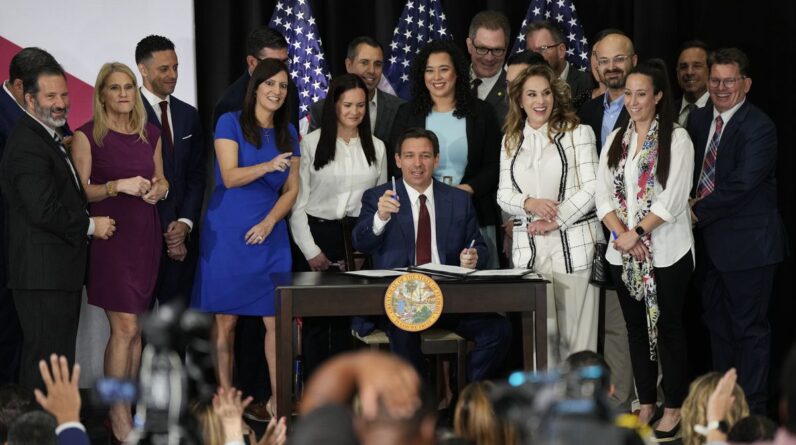
TALLAHASSEE — Potentially setting the stage for a legal fight, Gov. Ron DeSantis signed a bill Tuesday that will place additional restrictions on public employee unions, including preventing dues from being deducted from workers’ paychecks.
DeSantis signed the bill (SB 256) during an event with other state leaders in Miami. While the changes would affect a variety of public employee unions, much of the attention has focused on teachers unions, which heavily supported DeSantis’ opponent, Democrat Charlie Crist, in last year’s gubernatorial elections.
The Florida Education Association union also filed a legal challenge in March against the state Department of Education over rules implementing a controversial 2022 law that imposed book-related requirements on schools and other materials.
“Education unions have become political weapons,” Lt. Gov. Jeanette Nunez said during Tuesday’s event. “They’ve been spreading misinformation about things like the book ban hoax which we’ve succinctly debunked, but we also want to make sure teachers, at the end of the day, have money going into their pockets.”
The Florida Education Association quickly announced it will hold a press conference Wednesday to detail its “next steps, including litigation, in response to SB 256.”
“This new law grossly overreaches in trying to silence teachers, staff, professors and most other public employees,” FEA President Andrew Spar said in a prepared statement. “We will not go quietly; our students and our professions are simply too important.”
The Republican-controlled House passed the bill on April 26, nearly a month after the measure passed the Senate.
Among other things, the bill prevents dues from being deducted from workers’ paychecks, forcing union members to make separate payments. It also requires assessing how many eligible employees are dues-paying union members. If less than 60 percent of eligible employees are members, unions must be certified as bargaining agents.
It will also allow public employers to challenge union applications to renew registrations as bargaining agents if employers believe the applications are inaccurate.
Likewise, it will require that unions have audited financial statements, which they must make available to members.
Unions representing law enforcement officers, correctional officers and firefighters are exempt from the new requirements.
Legislative supporters of the bill argued it would increase transparency and strengthen unions. DeSantis announced Tuesday the elimination of payroll deductions from paychecks.
“Now you’re in a situation where people are getting paid. If they want to take a check later and write it to the union, they have every right to do that,” DeSantis said. “But they’ll do it with their eyes wide open and they’ll know exactly how much money they’re talking about.”
Learn about Florida politics
Subscribe to our free Buzz newsletter
We’ll send you a roundup of local, state and national politics coverage every Thursday.
You are all registered!
Want more of our free weekly newsletters in your inbox? Let’s get started.
Explore all your options
Similar bills have been proposed repeatedly in recent years, but issues such as eliminating fee deductions have not passed. Workers for Opportunity, a group that supports such proposals in numerous states, said Tuesday it had been working on the issue in Florida since 2019.
“Democracy works, and this is union democracy at its best,” Vincent Vernuccio, the group’s senior labor policy adviser, said in a statement. “With this new law, Governor DeSantis and state lawmakers are empowering Florida teachers to chart their own path forward and demanding more transparency from the unions that are privileged to represent these teachers.”
But Democrats said the bill was an attack on unions.
“The Legislature put obstacles in the way of many public unions, eliminating voluntary automatic deductions and making their existence more difficult by adding more red tape,” Senate Minority Leader Lauren Book, D-Davie, said in a statement Tuesday. “We can trust teachers to make their own personal choices about how they spend their hard-earned dollars, and trying to silence groups advocating for better wages and better working conditions is unconstitutional and undemocratic.”
Sen. Victor Torres, D-Orlando, described the bill’s changes as “union busting and decertifying public teacher unions throughout Florida” and said it will worsen the teacher shortage.
By Jim Saunders, Florida News Service.
News Service Attribution Manager Tom Urban contributed to this report.
[ad_2]
Source link





